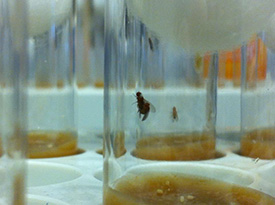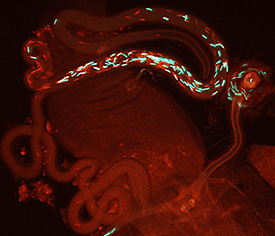Assistant Professor, The George Washington University, Washington, D.C.
Website
Research in my lab asks if and how a parent’s diet can influence the reproductive success and longevity of their offspring. There is mounting evidence that an individual’s environment can induce heritable modifications in DNA packaging that influence the morphology, physiology, longevity, and reproductive success of their children and even grandchildren. We are using the fruit fly, Drosophila melanogaster, as a model organism for understanding complex patterns of maternal and paternal effects on sons and daughters. We already know that when fathers are fed a high-protein diet as larvae, their sons enjoy greater paternity success, even when reared on a standard diet. Further investigations will follow three conceptual avenues. The first will examine if and how parental environment interacts with offspring environment to influence offspring fitness, in order to test the hypothesis that transgenerational epigenetic effects are adaptive and prepare offspring for the same environment experienced by their parent. The second avenue uses RNAseq to identify gene networks whose expression patterns are modified in offspring due to diet in their parents. We will then examine the molecular mechanism of the epigenetic changes using several acetyltransferase mutants to determine which histone modifications affect chromatin structure and therefore gene expression. Finally, we will use transgenic males whose sperm heads are labeled with green- (GFP) or red-fluorescent protein (RFP) to resolve mechanisms of sperm competition that generate higher paternity success in sons whose fathers were fed a high protein diet.
Materials are under development.
Materials are under development.


Dissected reproductive tract of a female Drosophila melanogaster that mated first with a male with GFP-labeled sperm heads and second with a male with RFP sperm heads. Sperm are stored within the long tubular seminal receptacle and a pair of round spermathecae (only one shown).